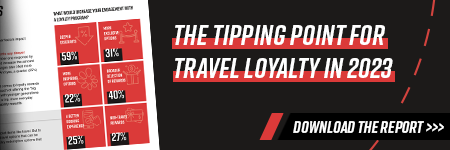Sustainability is an important concept for us at iSeatz, as you might be able to tell from the number of blog posts we dedicate to the topic. Not just because it aligns with our corporate values, but because sustainability is a key motivator for travelers and consumers, and it's something too few travel loyalty programs incorporate into their rewards portfolios.
Our previous research found that both credit card loyalty programs and hotel loyalty programs still have plenty of room to grow their sustainability-related redemption options. Now, our most recent report, Booking, Personalization, Sustainability, and Payments: The Tipping Point for Travel Loyalty in 2023, reveals a similar level of opportunity for the broader US travel loyalty industry.
Our survey found a healthy proportion – 45% - of American loyalty program professionals say they offer bonuses and incentives for booking sustainable options. But that percentage still lags the 65% of consumers who would be more likely to book a trip through a specific loyalty program if it offered more sustainable choices or received bonuses or incentives for booking climate-friendly options.
Closing that gap between the availability of environmentally-friendly rewards and the growing demand for these options can help loyalty programs grow their membership bases and boost engagement and per-trip spending among their current members.
But is the gap widening?
Many airlines, hotels, and travel brands are already incorporating sustainability practices in their operations, such as replacing plastic bottles with refillable dispensers, reducing water consumption, and offering carbon offset credits. But when it comes to their loyalty programs, these brands (as well as financial institutions) are somewhat less likely to partner with suppliers that prioritize sustainability (38%), contribute a portion of their revenue to sustainability causes or organizations (37%), or offer a full suite of sustainability-related redemption options (32%). Fifteen percent say they don't integrate sustainability into their loyalty programs at all.
What's more worrisome is the fact that only 7% of loyalty program professionals report that they plan to introduce carbon offsets or other sustainability features into their rewards portfolio in the next 6-12 months. Whether that reflects logistical or technological challenges, cost or budget considerations, or simply a sense that the sustainability options they have in place are good enough, it's a recklessly shortsighted trend.
Growth through younger generations
The apparent lack of investment in sustainable loyalty offerings is shortsighted because loyalty programs' most natural avenue for growth – younger members – put a significant premium on sustainability. Our report indicates that 36% of Millennials and 44% of Gen Z would be more likely to book a trip through a loyalty program if the provider contributed a portion of its revenue to sustainability causes or organizations. Forty-eight percent of 18–34-year-olds considered sustainable travel very or extremely important to their travel decisions, in contrast to 13% of the 55+ age group.
With 67% of millennials and 68% of Gen Z respondents planning to travel more in 2023 than last year, these demographics will be the ones driving demand for travel loyalty programs. It's in those programs' best interests to invest in the redemption and rewards options they want now, both to earn their affinity for the brand and fend off potential competitors.
Loyalty program providers that don't give the appropriate amount of attention to sustainability risk being left behind. More importantly, there's a real opportunity for loyalty programs to step up their sustainability efforts to both meet demand and better align with members' values. By sourcing suppliers that offer sustainable travel options, incorporating a wider variety of sustainability-related redemption choices within the rewards framework, and more visibly demonstrating their commitment to reducing environmental impacts, loyalty programs can be better positioned to capture the imagination – and travel dollars – of their members.
For more insight into consumer attitudes toward sustainable travel choices and to learn why sustainability is a rising opportunity for travel loyalty providers, download our latest report here:
Want to get more insights and updates from iSeatz? Sign up for our newsletter!

You can also learn more about iSeatz by reaching out to marketing@iseatz.com.

